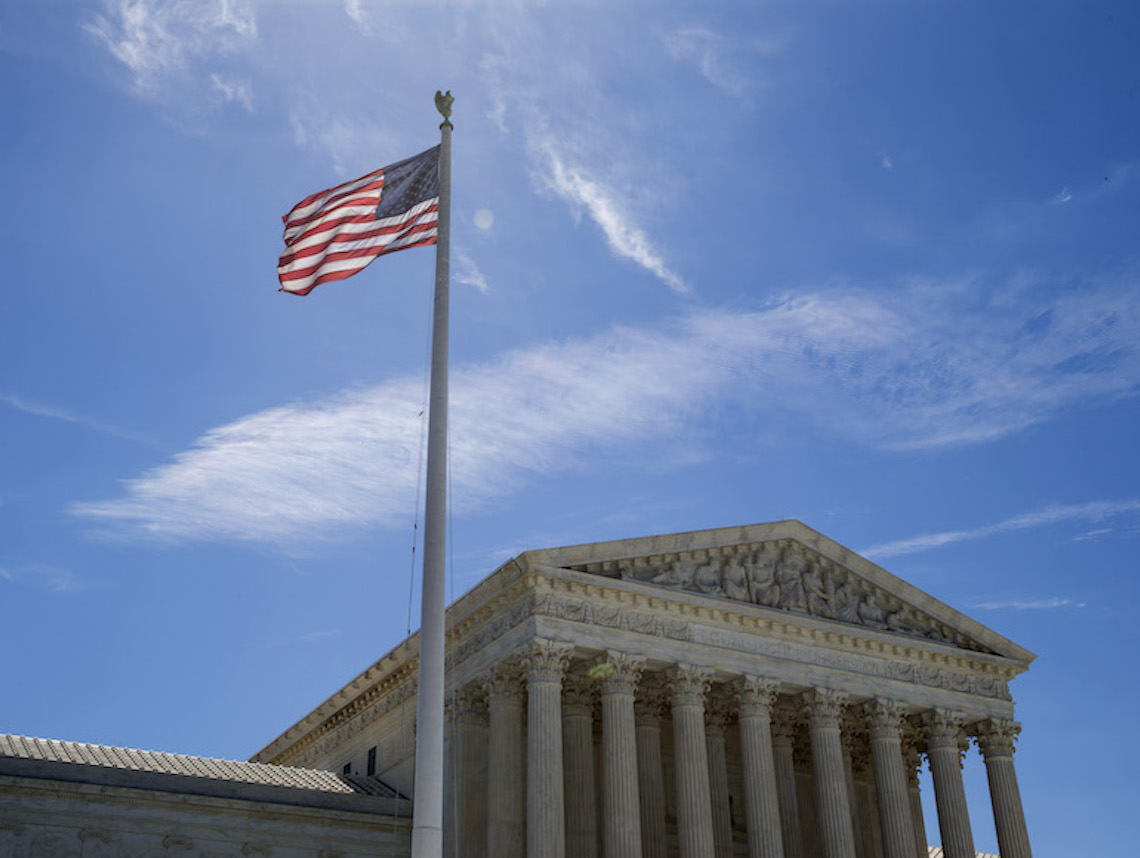 Photo by Eric Thayer/Getty Images
Photo by Eric Thayer/Getty Images A church playground in Missouri has become the unlikely focus of a sharp difference of opinion among Jewish organizations over issues of separation of church and state, following a June 26 Supreme Court decision on funding religious institutions.
Trinity Lutheran Church sued the state of Missouri for denying it a grant, offered to nonsectarian nonprofits, to enhance children’s safety by rubberizing its playgrounds. The case is Trinity Lutheran Church of Columbia, Inc. v. Comer. As Director of the Missouri Department of Natural Resources, Carol S. Comer is the named defendant.
The Supreme Court ruled for the church in a 7-2 vote that said denying a religious institution public funds for which it is otherwise eligible penalizes the free practice of religion. Four justices from the majority signed a footnote that limited the decision’s scope to public funding of religious institutions for a secular purpose, such as health or safety.
The Orthodox Union, which filed an amicus brief in support of Trinity Lutheran, is celebrating the ruling as a powerful refutation of religious discrimination. Other Jewish organizations, as well as several Los Angeles Jewish educators, echo concerns raised by the Anti-Defamation League (ADL) that the ruling erodes the separation of church and state and constitutes government overreach into religious activity.
“Allowing churches and other religious groups to compete for direct government funds is bad for religion,” Jonathan A. Greenblatt, the ADL chief executive, said in a statement. “States should not be in the religiously divisive business of choosing who, from among diverse houses of worship, should receive public dollars.”
Seven organizations signed the ADL’s amicus brief in support of Missouri, including the Central Conference of American Rabbis, the Union for Reform Judaism and the Interfaith Alliance Foundation.
Nathan Diament, executive director of the Orthodox Union’s Advocacy Center, dismissed the ADL’s position as an extreme stance on separation of church and state
“The ADL would be better served to deal with constitutional law as it is, rather than how they wish it would be,” Diament said.
The ruling however, is far from a cut-and-dried legal precedent. The majority opinion, written by Chief Justice John Roberts and joined by Justices Neil Gorsuch, Clarence Thomas, Elena Kagan, Samuel Alito, Anthony Kennedy and Stephen Breyer, leaves many questions unanswered, including whether direct government funding would tie religious institutions to any government regulations.
“The constitution treats religion differently. That idea appears to have been lost [in Trinity Lutheran v. Comer].” —Rabbi David Saperstein, senior adviser on strategy and policy for the Union of Reform Judaism
“They who control the purse strings control the vision and direction of an institution,” said Bruce Powell, head of school at de Toledo High School in West Hills. “We have to be very careful in taking public dollars and not ceding control of our educational processes.”
Powell said he is ethically opposed to taking money directly from the government. He is hesitant to divert state funds from the public school system, and said he worries that religious schools could become dependent on fickle government funding decisions.
Rabbi Aaron Panken, president of Hebrew Union College-Jewish Institute of Religion, said his primary concern is that the ruling opens the possibility that the government could be more favorable to certain religions in choosing which sectarian institutions to fund.
A danger also exists that the legal precedent for treating religious institutions exactly as nonsectarian institutions are treated could undermine special privileges and protections afforded to religious institutions.
“Only religion has an establishment clause,” said Rabbi David Saperstein, senior adviser on strategy and policy for the Union of Reform Judaism. “The constitution treats religion differently. That idea appears to have been lost [in Trinity Lutheran v. Comer].”
Saperstein said he worries that fear of losing government funding might chill religion’s historical function of preaching truth to power.
Yet, for all the hypothetical risks the ruling presents, its immediate legal repercussions in California are slight.
California is one of 38 states with a constitutional provision called a Blaine Amendment, which prohibits the use of public funds to support religious institutions. Michael Helfand, associate professor of law at Pepperdine University and co-author of the Orthodox Union’s brief, said he is unaware of any existing California funding programs that exclude sectarian institutions solely for their religious character. Nor does California operate any sort of voucher program to help residents pay tuition at private schools.
Security funding — a secular benefit that religious schools are eager to obtain — is handled primarily at the federal level by the Department of Homeland Security, where there is no prohibition against funding religious institutions with taxpayer dollars.
Helfand said the ruling is symbolic, particularly in its weakening of state Blaine Amendments.
“We have seen a spike in hate crimes against religious institutions — a limited spike within the Jewish community, and an even higher spike within the Muslim community,” Helfand said. “This type of statement from the Supreme Court that everybody deserves funding to protect their institutions is vital at this juncture.”
It is plausible that Trinity Lutheran v. Comer is only a precursor to a broader expansion of funding for religious institutions. Justices Roberts, Thomas and Gorsuch did not sign the footnote limiting funding to secular benefits, leaving open the possibility that the legal wall prohibiting government funding for religious activity might eventually be broken.
Helfand and Diament said that such a development would be an unwelcome encroachment by the government on religious activity, even for a group such as the Orthodox Union, which wants state funding for secular benefits.
Unless the Supreme Court expands its decision or California offers sectarian schools a grant, Jewish schools in the state shouldn’t see any tangible benefits — or harm — from Trinity Lutheran v. Comer.





















 More news and opinions than at a Shabbat dinner, right in your inbox.
More news and opinions than at a Shabbat dinner, right in your inbox.